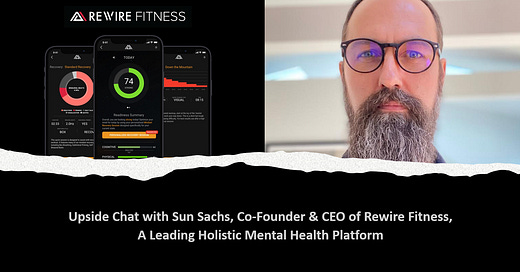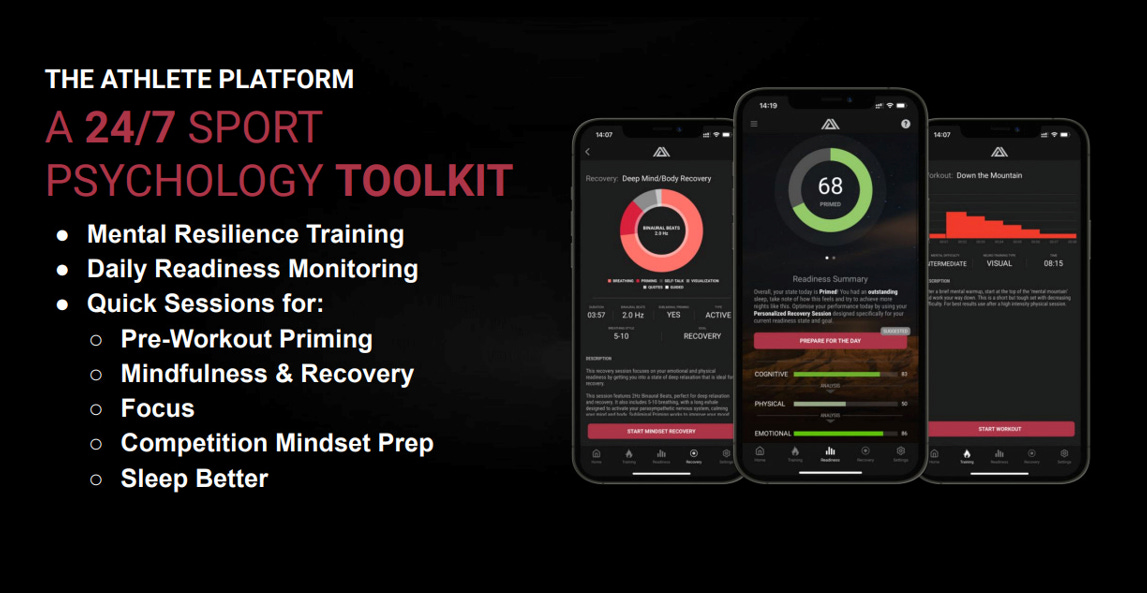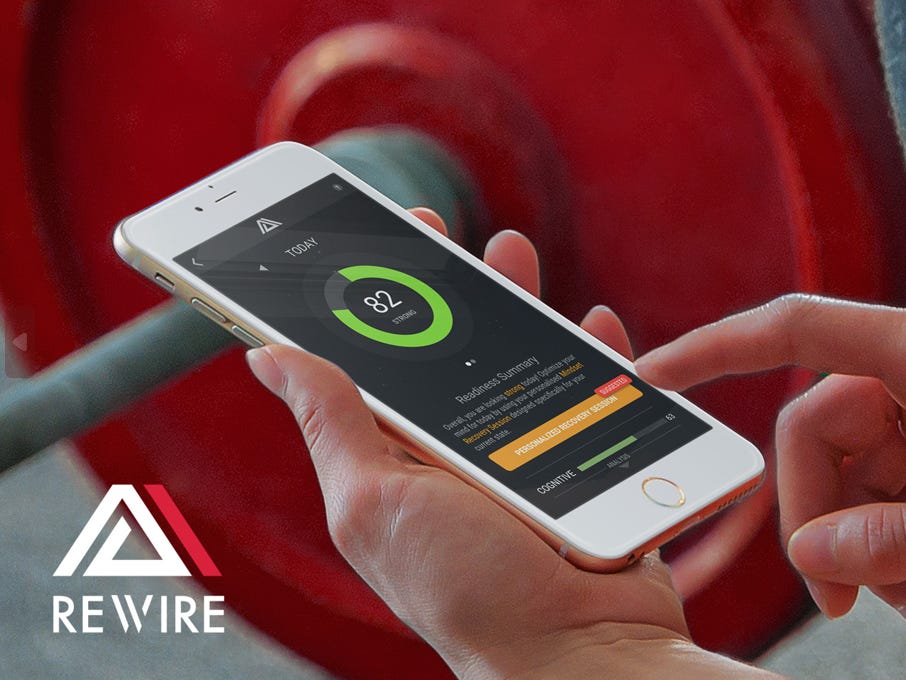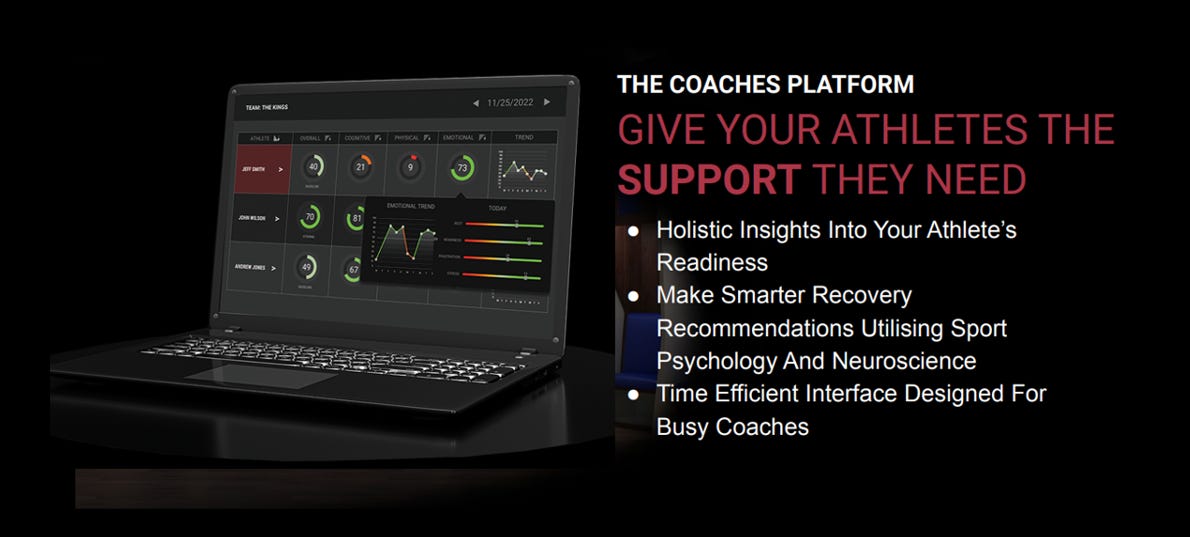This week we interviewed Sun Sachs, the CEO & Co-Founder of Rewire Fitness, a holistic mental fitness platform for athletes & teams that provides tools for improving resilience, performance, and recovery.
Founded in 2018, Rewire Fitness is a human performance company that provides evidence-based solutions for tracking athlete readiness, building mental resilience, and improving mind/body recovery. Rewire's patented technology integrates protocols used by the Navy SEALs, NASA, and neuroscience to help athletes and other populations reach their ultimate potential.
Rewire Fitness offers a mobile app that allows athletes to create a training plan for building mental fitness. The mobile app can also be synced with wearables such as the Oura ring, Garmin, and health apps.
The app has three main sections. It has a mind/body solution for improving athletes’ mindset for competition and optimizing their recovery & sleep. Athletes can also use it to work on their “mental weights”, which is a specific cognitive task that creates an adaptation resulting in more mental and physical resilience for athletes.
The mobile app also has a 90-second test where the athlete can assess themselves physically, cognitively, and emotionally during their morning routine. And based on that, the app will recommend an intervention to help make the best of their day based on their goals.
Picture: Rewire Fitness app
Picture: Readiness assessment.
Rewire Fitness also provides a team dashboard for coaches and teams, which is totally integrated within the app. Coaches can check on the status of various players simultaneously. It also has a communication tool to communicate with the athletes and recommend interventions using a sports psychology tool kit.
Here are some pictures of the Rewire Fitness dashboard for teams:
So what is the impact on an athlete’s performance?
On average, Rewire Fitness can help athletes reduce stress by 70%, and improve their focus and readiness to perform by 30%.
Here is a video showcasing the Rewire products: ‘
Rewire Fitness has been working with top athletes and coaches such as Kyle Korver, a former All-Star NBA player. They also work with a variety of teams and organizations across a wide range of sports. Under Armour was also one of Rewire’s first investors. For more information contact sun@rewire.team
📝Show Notes: Through this interview with Sun, we touched on his background, his company, product, and competitive advantages. We also touched on the benefits for the teams and athletes to use its products. We also discussed his business model and the pro teams using his product today. Lastly we discussed his plans for the next 12 months.
Best Quotes: Here’s some of the key discussion points and best quotes from our conversation with Sun:
On his background in sports and product development:
“I have a background in sport (…) I grew up in Boulder, Colorado, which is the hub for endurance sports. So I found my way into cycling, and worked my way up to an elite level. That was all I wanted to do. This was my passion (…) Unfortunately, like many athletes, I suffered from burnout and injury and ended up retiring early at 26 years old”.
“But then I had the good fortune to have a natural talent in software and product development. So I got into product and software development and worked for a variety of companies here in New York, some media companies and startups like AOL”.
“I literally built hundreds of apps and products at scale for consumers and businesses. And of course I never left that athlete mindset. I was always looking at tools and ways to improve”.
On how he got the idea of starting Rewire Fitness:
“I had been aware of this particular branch of science around resilience training for the mind (..) I first heard about the science around 2013. I was blown away because basically it was showing that with the right kind of cognitive task, you could increase your athletic performance significantly”.
“And so I was just incredibly excited about the science and I kept waiting for it to come to market (…) And it never came to market. So three or four years later, I was sitting on my bike trainer doing a workout, and I had this epiphany for how it could be done and realized that based on what I've built over the past 25 years I had all the skills to be able to create that”.
On the importance of the mental aspect in athletes’ performance and how their solution can have an impact there:
“The initial insight is something that when we speak to coaches and athletes, at any level, what percentage of their performance is mental, and they'll undoubtedly say above 50%.”.
“Then we'll ask them, well, how much time do you spend on it, given its importance? And there's often a big fat zero or very little or they're just trying to push their athletes hard for a side effect of resilience. So what's exciting about what we do is we have a direct path via evidence-based solution to really build more resilience and help with mind body and really holistically understand where the athletes are at each day. So these are the three pillars of our system”.
On some of their investors like Under Armour and Kyle Corver (former NBA player), and seven other pro athletes:
“We had a lot of strategic investors when we first founded the company. Under Armour joined us. This was their first startup investor out of a new fund that they created so they got behind us even before we had a live product”.
“Kyle Corver, the former NBA All Star player, started as a user. He loved the product and became an investor, and an ambassador for us. We ended up getting seven other professional athletes as well in Europe, and some footballers and tennis players”.
On his mobile app works:
“You basically download the mobile app and you get asked some questions and it will create a training plan for you. You can also sync any number of wearables like the Aura ring, Garmin, the health apps, et cetera. That's going to help inform some of the insights”.
“And then there are really three primary sections of the tool. On one side, we have a mind body solutions to improve your mindset. It can also be used for competition and to optimize recovery . If you are traveling, which most athletes and teams are doing, managing sleep is a big problem. Managing stress is a big problem”.
On how the mobile app enables meditation sessions which helps reduce stress by 70%:
“So we have these short two to four minute sessions. Think of them like an alternative to meditation that's much more accessible, where you're going to do breath work, you're going to do sports psychology, and neuroscience. You come out of it feeling significantly better. For example, the average improvement in stress reduction by our athletes across the whole platform is 70%. So it's a massive change with just a little bit of time”.
On how their mobile app enables athletes to work on mental weights:
“Another section of the tool is around mental weights. It is a specific cognitive task that creates an adaptation resulting in more resilience and that's going to help you in sport and life”.
On their 92 seconds test via the app which is part of a morning practice:
“And then the last part which is part of a morning practice. We have a 92 seconds test where the athlete can assess themselves physically, cognitively and emotionally. And based on that, we'll recommend an intervention to help make the best of their day”.
“So let's just say they've been traveling, they had a bad night's sleep. They're kind of stressed out. The system's going to pick up on that. And it's going to provide tools to help recover from a bad night's sleep so they can still perform because of course they can't get a pass if their score is poor. They still have to perform. And what we want to do is support the athletes and the teams on a 24 7 basis”.
On their team’s dashboard:
“The last part of it is our team platform that provides a sports psychology toolkit for the coaches, and it's totally integrated with the app as well where coaches can check on the status of various players simultaneously. And on top of that, it has a communication tool to communicate with the athlete as well as the sports psychology toolkit”.
“So if they pick up that the athlete had a bad night's sleep, they're stressed out, they can actually click a button and it'll send an intervention right to them”.
On how athletes usually use their mobile app daily:
‘The typical use case that we see with athletes across the board is this. They wake up in the morning. They'll do a quick check-in, which is going to help them understand where they're at. Normally you wouldn't really understand if you have a lot of cognitive fatigue or if your reaction time is going be compromised or other things that are pretty crucial going into the day. So they'll do that. They spend 90 seconds.
“Then post-training, we'll bring them back in for, again, a two to four minute session. And then oftentimes athletes rely on the sleep tools. So they'll do something near the end of the day. And in total we're talking about five to ten minutes a day tops for a great improvement in their state and their performance”.
On the types of teams, athletes and coaches using their mobile app today:
“We have organizations using it really just to support health and wellness for their athletes. We have eSports teams that use it for mental performance. We have entire sports academies such as prep schools that have it for all of their teams”.
“And then their coaches use it across the whole organization. We also have some gyms using it oftentimes to understand what the athletes or the clients are doing outside of the gym. And then there are a lot of individuals using it. We are talking about endurance sports. There are a lot of individual coaches that use it really for that deep monitoring where they have a close relationship with the athlete and they want to support them when it comes to their cognitive, emotional and psychological state”.
On their key competitive advantages:
“We have a first to market IP, so we're the only ones doing this holistic mindset, and performance and recovery system. We also have a US patent and also international patents pending. So we were granted the patent last year and we have a pretty big moat of research and iterative product development, working with our scientific advisory board, so I think it would be hard to reproduce”.
“And then we have patented IP and a lot of insights that we've learned over the years, working very closely with users”.
On their business model:
“ So it is a SaaS model and a subscription. The teams pay on a seat license for the number of athletes and coaches. So it is very easy to deploy. The app is obviously available for all the athletes on Android and iOS. And the team platform is web-based. Typically organizations will do an annual contract with us”.
On their plan for the next 12 months:
“We're still an early stage startup, and we are very focused on growth. So we intend to continue to scale across college and professional sport as well as form more strategic partnerships with different organizations”.
“And then being an evidence-based business and product, we're going to be pursuing more grants for ongoing research. So we'll just continue to innovate on that front as well”.
“We'll be doing a fundraising later this year. So if there are folks that are interested, they could definitely reach out to me. I am happy to have a chat”.
You may also like:
🔥 Upside Chat: Dave Hancock, CEO, Apollo (Leading Athlete Management Systems (AMS) vendor)
🔥 Upside Chat: Ismael Fernandez, ThermoHuman CEO
🔥Upside: AMS Ecosystem Analysis: Key Trends, Vendors and Recommendations to Teams
💦Upside Analysis: The sweat and heat sensing market (Key Trends, Vendors)


















Share this post